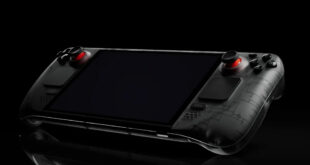
Foldable screen technology might be unproven in smartphones, but that hasn’t stopped companies from integrating them into even larger products. According to Intel, however, there’s no plan to bring foldable laptops to market in the near future.
Seriously, we need a better term for this than “foldable.” Laptops fold already. “Foldable” at least works for smartphones because the vast majority of smartphones no longer fold, and phones that do are now referred to more as a “flip phone” than a “folding phone.” The expectation of a laptop, however, is that it folds, while a tablet does not.
Senior Intel executives, speaking to the Nikkei Asian Review, have stated that Intel is exploring this technology as potentially interesting for its own work. “It’s early pathfinding now, and we are trying to understand the capability and the limitation of the [foldable] technology,” Joshua D. Newman, Intel’s general manager of mobile innovation and vice president of the company’s Client Computing Group, said Wednesday on the sidelines of an Intel symposium in Taipei.
There are so many questions outstanding about foldable device technology that it’s not at all clear any of this research will produce a viable product. A laptop with a traditional keyboard could incorporate a horizontal hinge that extended the display upwards, but this would change the center of gravity on the laptop![]() , necessitating a heavier and possibly wider base to counterbalance the fully extended screen. Hinges could theoretically be used to widen the display — imagine a foldable laptop with two hinges, one on each side, that could transform a single 16:9 laptop into, say, a 21:9 or even 32:9 ultra-wide panel.
, necessitating a heavier and possibly wider base to counterbalance the fully extended screen. Hinges could theoretically be used to widen the display — imagine a foldable laptop with two hinges, one on each side, that could transform a single 16:9 laptop into, say, a 21:9 or even 32:9 ultra-wide panel.
Credit: US Army RDECOM/Wikipedia
I suspect this could be interesting in certain productivity scenarios, especially if it replicated some of the advantages of multi-monitor productivity or surround gaming. Widening the display also wouldn’t alter the center of gravity as much as making it taller via the hinge. It would, however, functionally require two hinges to balance the extensions, and presumably be an even more difficult lift.
Finally, there’s the idea of an all-glass “laptop” that eschews the keyboard at all, This kind of concept is shown in the image above, and I’m fundamentally uncertain it’s a thing customers would want. I’ve typed on “virtual” keyboards before — the sort that can be projected on to certain surfaces and then typed on. They are, at best, functional. But if you use your laptop for serious work, a virtual keyboard is not a substitute for the real thing. If I couldn’t use a standard keyboard, I’d probably try to transition to a text-to-speech solution before I was willing to move to a virtual keyboard 100 percent of the time.
But all of this assumes that folding devices can be manufactured in a way that won’t expose the innards of the device to critical damage, that prices can be brought down to normal levels, and that consumers want these products in the first place. I fundamentally agree with Intel — pathfind all you want, but these products will not launch any time soon. The enormous premium on the Galaxy Fold and the difficulty bringing that product to market suggests laptops are well outside the possible — at least for now.
Now Read:
- Google Is Working on a Foldable Phone Prototype, Too
- Samsung Will Cancel Galaxy Fold Pre-Orders Unless Buyers Opt-in
- Samsung Forces iFixit to Pull Galaxy Fold Teardown
 #Bizwhiznetwork.com Innovation ΛI |Technology News
#Bizwhiznetwork.com Innovation ΛI |Technology News




